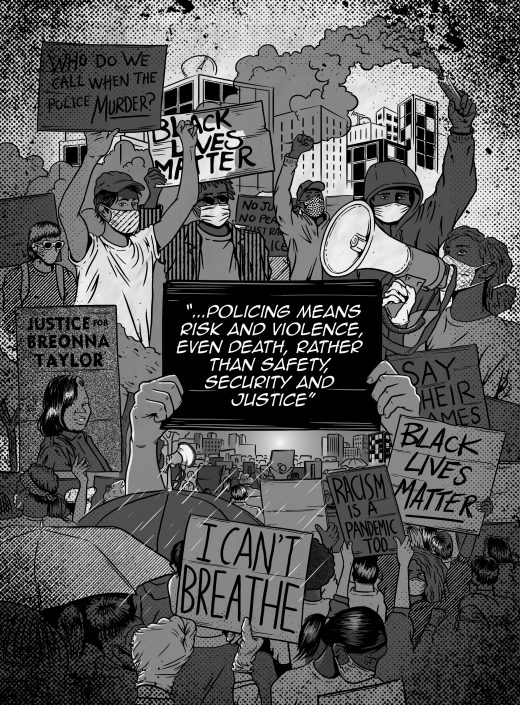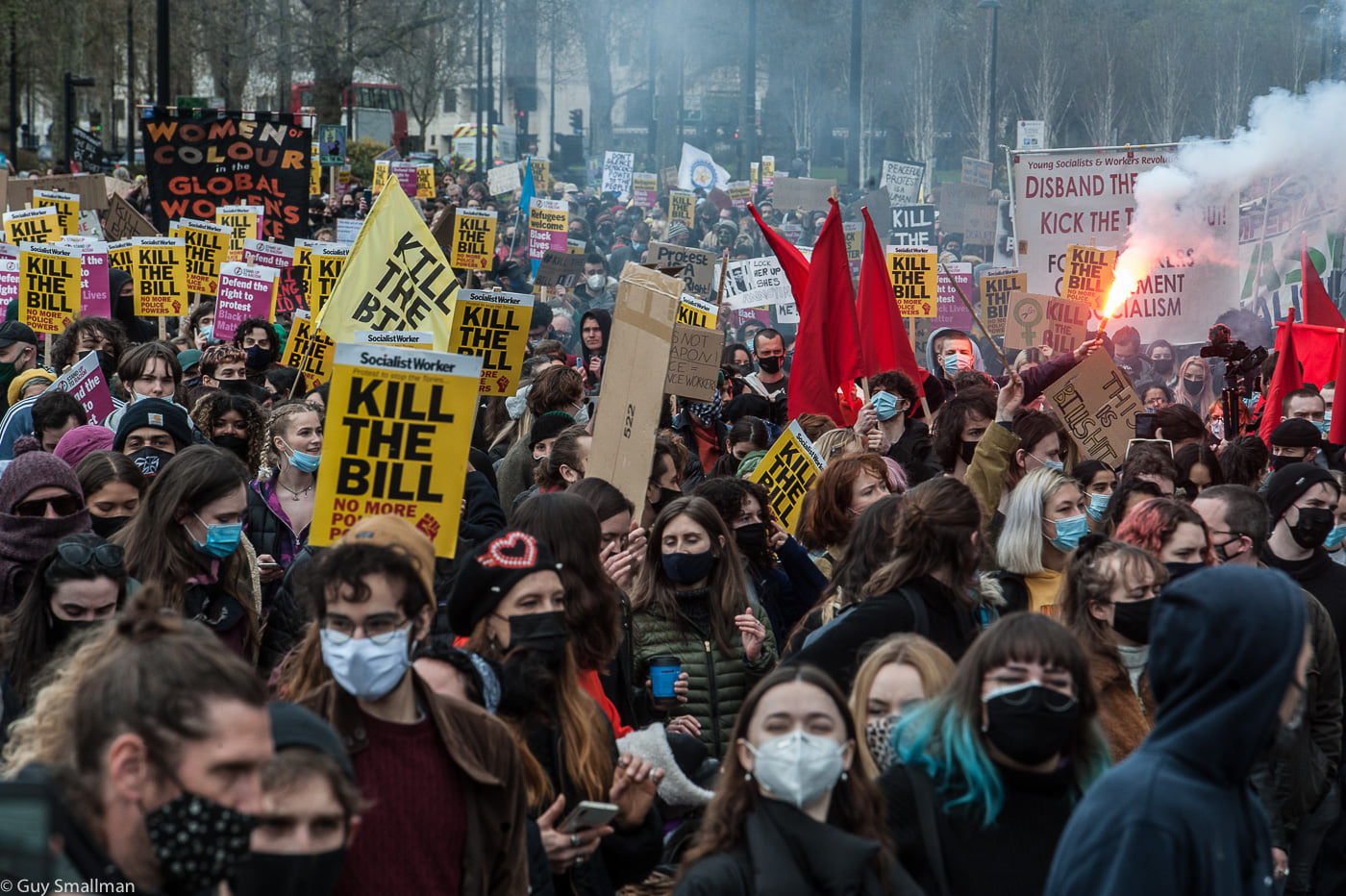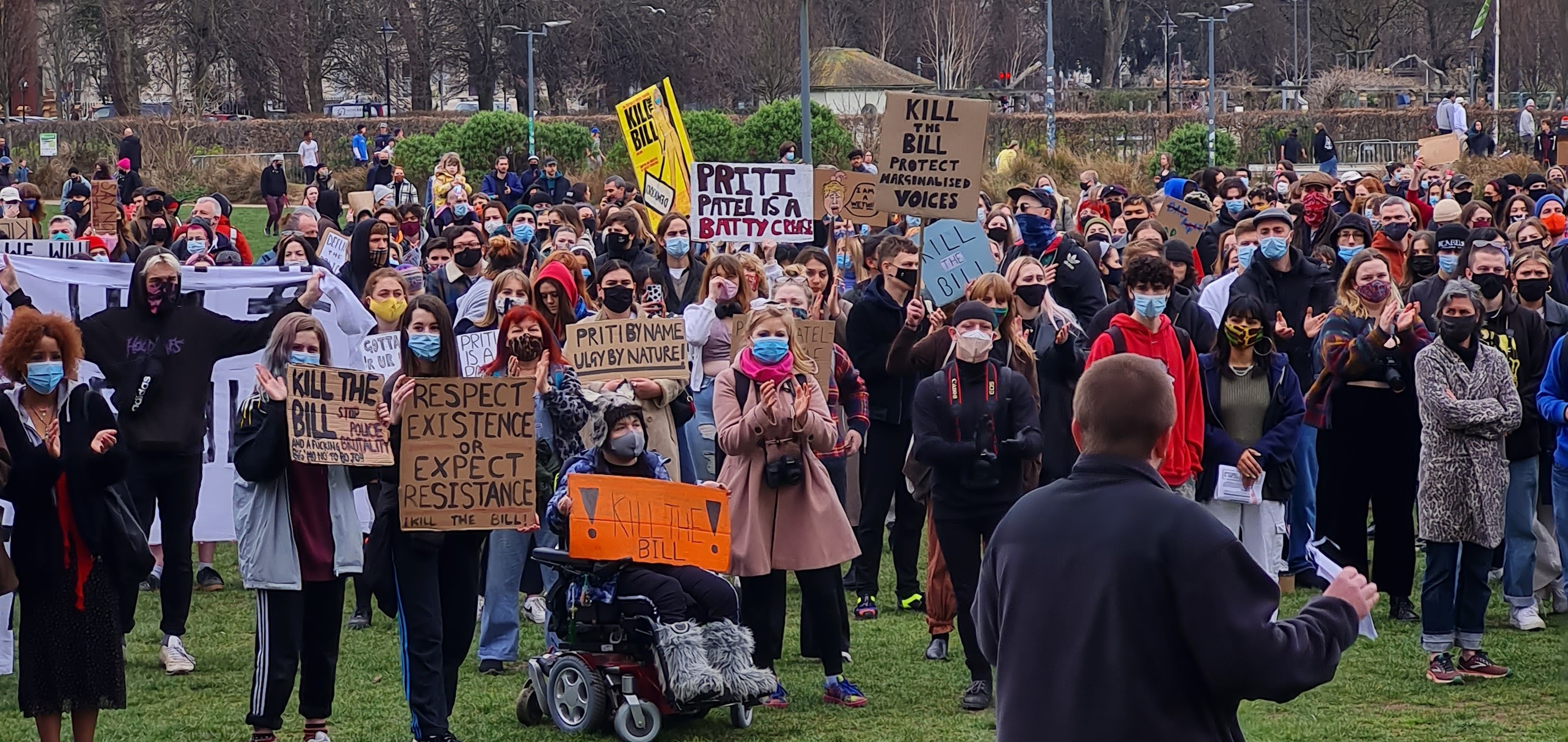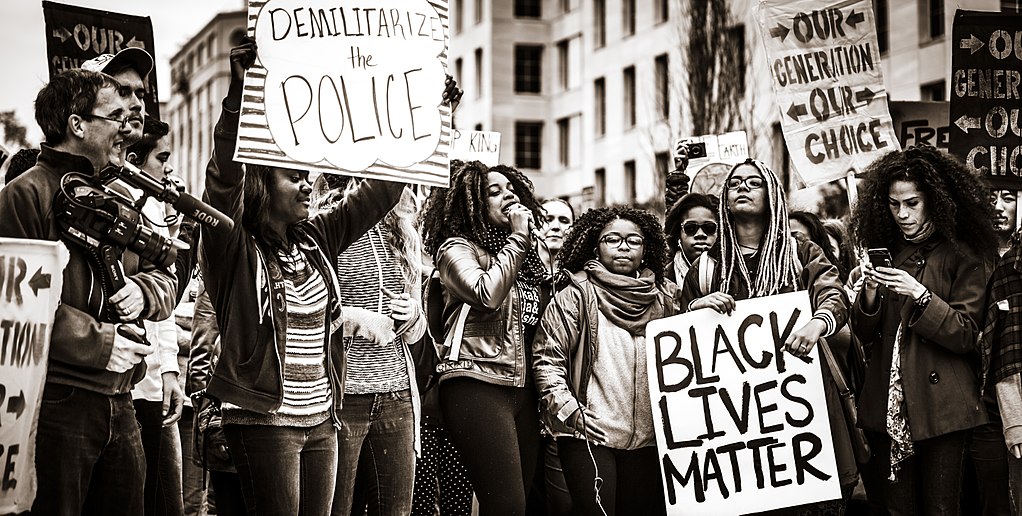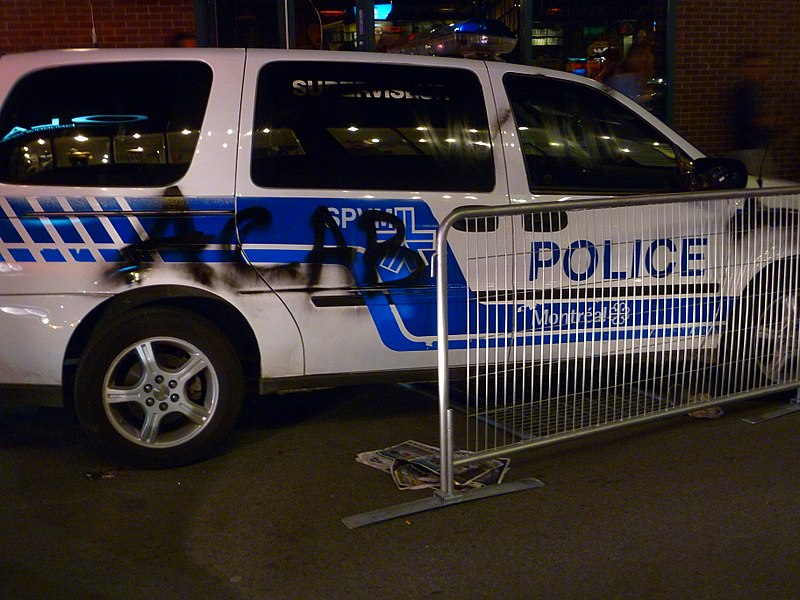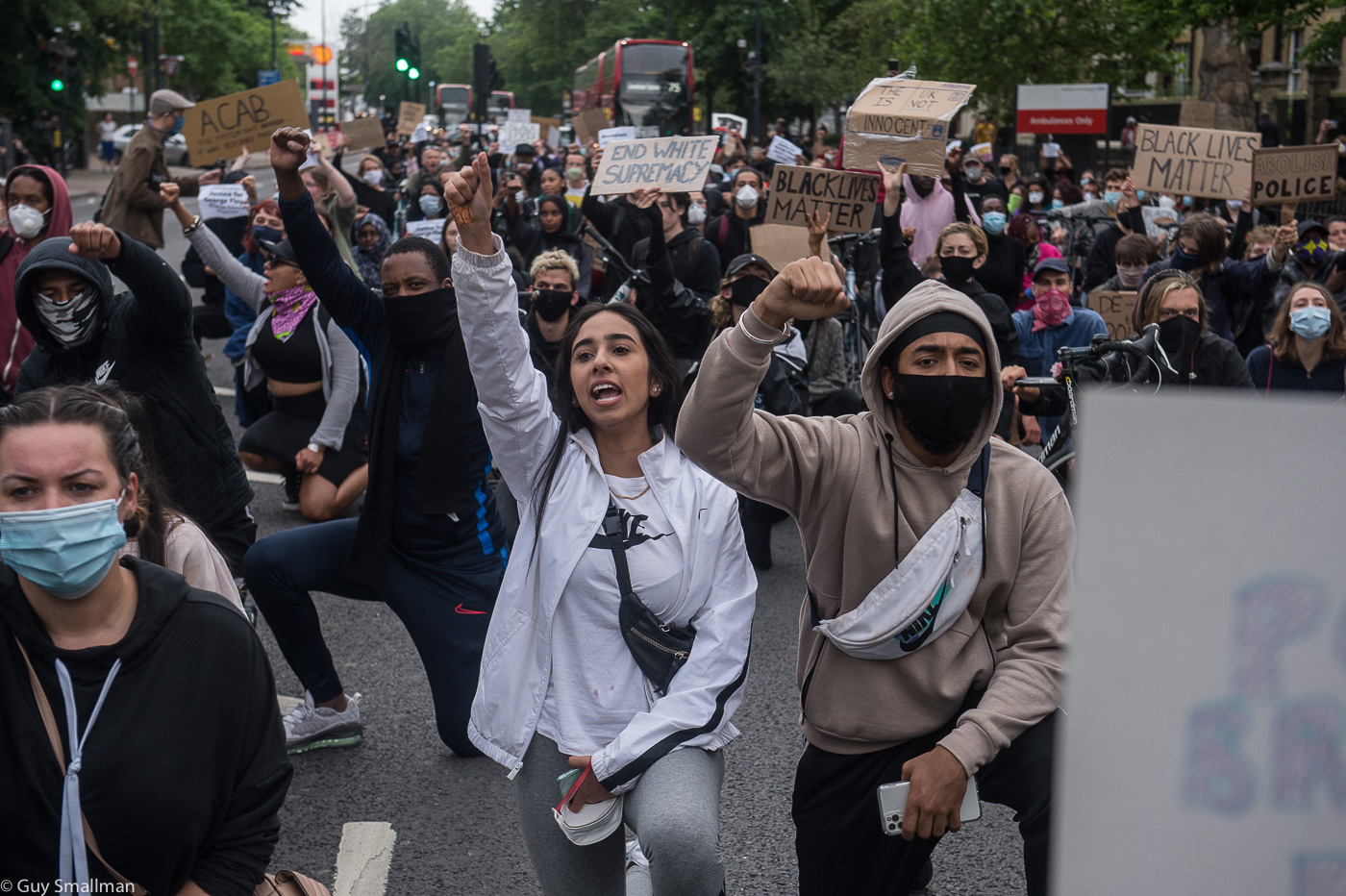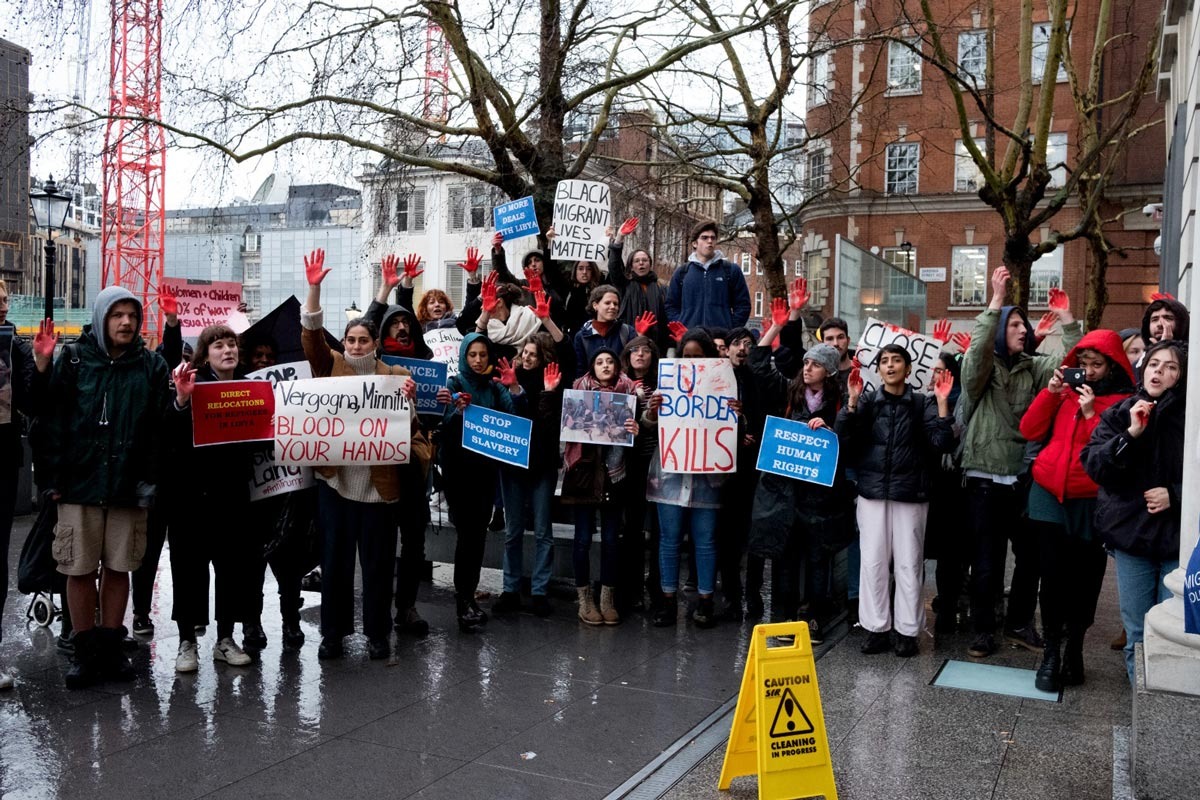The State we’re in
It has been a tough year. Few would argue against that, perhaps apart from the likes of Elon Musk and Jeff Bezos, who have taken the opportunities you’d expect, amassing further hordes of obscene wealth. But we digress – it’s been very, very hard: we’ve lost our incomes, we’ve lost jobs, we’re in debt, we’re facing eviction and we’ve seen our family members, our friends, our neighbours, our elders and vulnerable community members… get ill and die. We’ve seen 126,000+ people in Britain die. Preventable deaths, many of them. We’ve seen a sharp rise in domestic abuse and we’ve seen many, mostly women, managing the triple shift of family and child care, home-schooling and paid work, if they’ve kept their jobs that is. We’ve seen government fluster and flounder in the face of the covid-19 pandemic. We’ve been subject to bizarre regulations and we’ve had lockdown followed by relaxations, followed by lockdown. Actually what we’ve seen is government and the state trying to balance ‘the economy’ with our wellbeing… and gloriously fucking the whole thing up for us in favour of the economy. This isn’t just an aside. It’s part of the very current background to the events in Bristol on 21st March, the first day of spring and, effectively, the first birthday of the pandemic.
We’ve seen the Trump regime crumbling in the USA – in favour of an anodyne and not quite-so-macho Biden version of the New World Order – and we’ve seen brutal racist murders, by the cops. Black Lives Matter was already an organised movement for very good reasons, and the murder of George Floyd wasn’t the only one… but it was a trigger for righteous rebellion, not just in America, but here too.
There were plenty of BLM protests. While deranged Donald, the state and the media in the US blamed ‘antifa’ for uprisings, the government here, particularly Priti Patel, focused on the removal of the statue of Edward Colston, slave trader supreme. It’s an easy and diversionary tactic to do this. Pick on one comparatively minor but symbolically significant event, don’t focus on the thousands who marched and protested; and fill the media with ‘rights and wrongs’ and tales of ‘extremists’ and ‘lawlessness’ and the hope is that we’re tempted to forget that racism and racist violence are a major enemy of all of us. In turn that makes the judiciary and the police our enemies too. A brief look at the numbers of Black and Brown people who’ve been battered or killed by police and their numbers in our prisons shows that very clearly.
Ms Patel roasted Avon and Somerset top cops for allowing the people to remove Mr Colston from their city centre. Frankly, it’s remarkable that the statue stood for so long. But the Home Secretary was not impressed, while we were. Her voice here is important because it provides a window onto the mind of government and the state. Harking back to days of empire, Patel – herself the daughter of Gujarati folk who came to Britain via Uganda – for reasons of Toryism rather than any sense of her ancestor’s oppression, couldn’t stand the sight of ‘British’ monuments, however offensive, being tumbled. It was a red line for her and we crossed it, joyously and unashamedly, while her police opted for impotence. It chafed her political soul that Bristol’s cops stood back and allowed Edward’s felling. The fact is that if they’d tried, they’d have been battered and that’s why they stood down. So the compromise is that the ‘Colston 4’ are going through ‘the legal process’, hung out to dry for a brave action that thousands, if not millions, applauded. The major point here though, is that people took control of Bristol’s centre that summer’s day, happily, with no violence, no looting. And that is what government can’t tolerate. For one afternoon, the thin veneer of state control was lost. Again, this is essential background to the events in Bristol on 21st March.
A very thin blue line
Fairly recently the numbers of cops in the country dropped significantly. Three years ago, The Guardian, hardly a radical news outlet, reported that, as Home Secretary, from 2010-2016, Teresa May cut police budgets by 18%. While this may have been spurred by global economic collapse and ‘austerity’, it meant the loss of 21,500 cops. Not necessarily a clever move for a right wing government. As the newspaper pointed out: ‘May was told in 2010 that in cutting police funding she was making a mistake that Thatcher never made when she instinctively realised that there would come a crucial moment when the country, and her premiership, would depend entirely on the resilience of the thin blue line’.
And this is in part why the current government is in panic. It is trying to introduce legislation that would have made Mussolini or Pinochet proud, yet knowing that it doesn’t have the cops to police it, literally.
While there has been a slight adjustment in police numbers, that’s mainly reflected in a recent increase in armed cops, because the state has focused on ‘the terrorist threat’ and its own brand of Islamophobia and taken its eye off the ball – that the greatest threat to the state is always us – when we are an organised mass which acts in solidarity with common cause. Thatcher knew that, hence her vicious policing, media and divide and rule tactics during the miners’ strike of 1984-5, ably assisted by the Labour Party, to dismantle the single most powerful union in the country: workers, their families, friends, allies and comrades, fighting for their lives, their communities and their dignity.
The state also knew it when, in 1979, it saw fit to deploy nearly 3,000 cops to defend to the hilt about 100 National Front activists in one of London’s most non-White areas, Southall. It was no surprise that this occurred during Thatcher’s general election campaign, feeding as much as it could on the racism in the country, with a concerted effort to turn NF supporters into Tory voters. Needless to say, the brutality displayed by the Metropolitan Police against thousands of protestors was extreme, resulting in a gay white man, a school teacher, Blair Peach, having his head caved in by a police truncheon and dying. It took a year for an inquest to find that Peach had ‘died through misadventure’. His misadventure was presumably that he was an anti-fascist who foolishly got his head too close to the swinging truncheon of a savage cop. This perverse verdict had a purpose – it locked the door on an investigation into the police. Had there been an investigation, unless heavily rigged, it would have revealed the depth of racism and violence within the police.
More recently, taken a little by surprise in spring 1990, the police didn’t anticipate the rage of a massive demonstration in central London against the Poll Tax (now neatly remodelled and rebranded as Council Tax). Many months of grassroots organising against the tax culminated at this demo and it only took the usual police attempts to kettle, brutalise and show that they were the biggest gang in town, to spark a significant confrontation. The fact that the cops took an almighty hiding and much of central London was no longer controlled by them that day sits sadly in stark contrast to the many who were arrested and taken through the courts, facing absurdly harsh prison sentences for resisting and combating the police. The political violence of the police and the state is well-documented and is again, part of the background to the events in Bristol of 21st March.
Crime wave?
Unsurprisingly, the reduction in cops in our towns, villages and communities hasn’t resulted in the ‘Christmas for criminals’ promised by the Tory Right and the redtop newspapers. Why? Well, simply, the overwhelming majority of people don’t rob each other, don’t beat each other to bits, don’t deal vast quantities of class A drugs, don’t attack people who seem a bit different to them and don’t form criminal gangs or vigilante mobs. Even in – and partly due to – a pandemic, people tend to be kind and caring to each other. Just look at the exponential growth of ‘mutual aid’ groups from March 2020 onwards. It wasn’t the state, the cops or local authority social workers who were checking on their friends, neighbours, relatives and elders, running errands, bringing food, helping to pay bills etc. It was us. Normal working class people.
Fast forward… here and now
What have we seen, during the pandemic and lockdown, in the last few weeks? We’ve seen the husband of the richest woman in the country, Rishi Sunak, announce a very temporary extension to the financial cliff edge that many of us face, in terms of welfare benefits and jobs. We’ve seen our prime minister wallowing like a pig in shit at the rollout of a vaccine, the development of which had little to do with him or his government, although he had much to do with the refusal to raise NHS workers’ wages by more than a completely offensive 1%. We’ve seen horror stories about vaccination programmes not reaching the poorest peoples on our planet. We are repeatedly reminded that we are on the brink of environmental catastrophe; and we know that world governments are at best making tokenistic promises and actions that do nothing in the face of the ongoing onslaught of capitalism that creates this emergency in the first place.
And we’ve witnessed the sexual brutalisation and murder of a woman walking home in London, by a police officer: Wayne Couzens was a serving Metropolitan Police Offer, an armed cop, working in the Parliamentary and Diplomatic Protection Command. He was trained to be a killer. He became a killer – a vile, misogynistic one.
We’ve also seen have the Metropolitan Police’s disruptive and disrespectful response to the Clapham Common Vigil – and other vigils across the country – to witness and show quiet and dignified rage for Sarah Everard’s hideous death.
Killing me softly? No chance!
Perhaps Boris and Priti realise that Margaret Thatcher and her advisers were right, in terms of the maintenance of state control; and that government right now will depend entirely on the resilience of the thin blue line. Maybe they thought that during our current lockdown, somehow the Police, Crime, Sentencing and Courts Bill 2021 would pass through the Houses of Commons and Lords without too much fuss. Clearly they were very wrong. So why now? Well, amongst many others, there are some obvious answers:
- The BLM movement has helped us to focus on racism and its effects. Institutional racism is very much alive and well, not least in the police.
- The idea that the police protect us all and our communities has been shown to be a farce. Who killed Sarah Everard? A police officer. Who broke up the London vigil for her? The police – using the excuse of Covid legislation. This looks and feels like institutional misogyny.
- Increasing numbers of people are facing poverty and the various benefits schemes to help them have only been extended until September.
- The pause on evictions for rent arrears ends in May and this is likely to result in eyewatering numbers of people facing homelessness.
- Brexit has clearly screwed up the country’s trade with the rest of Europe and this is likely to result in more businesses going to the wall and further job losses.
- It’s estimated that around 3.6 million EU-born migrants are living in Britain, 5.5% of the population. Those who have pre-settled status rather than EU settled status currently have no ‘right’ to claim and receive welfare benefits, pending a Supreme Court case due to start on May 18th. If government – in the form of the Dept. for Work and Pensions – wins the case, at least 1,614,600 people will face destitution unless they have jobs that pay enough to afford rent, heating, council tax and food.
- Apart from the fact that young people are often vilified in the media en masse, the pandemic and the country’s screwed economy mean that many will be out of work and dependent on their friends, families and pitiful welfare benefits levels to make ends meet.
Bearing these points in mind, the government is, as ever, unlikely to come clean about its failures and the failures of capitalism generally. But it does expect increasing civil unrest and rebellion. It has made our bed and very few of us are likely to want to lie in it. So the terms of this Bill are fascistic, designed to make even the most mild protest unlawful – to the point that police ‘discretion’ is maximised and their powers are increased to such a level that an individual standing outside a supermarket, shouting about the high cost of baby nappies, could be arrested and charged.
It’s no surprise then that the country saw a number of Kill the Bill demonstrations and protests on the weekend of 20th/21st March. It’s equally unsurprising that, yet again, the Home Secretary and media’s focus was on Bristol. Why? Well generally the police are used to large, usually good-natured protests and marches around the city centre. On this occasion, thousands of people gathered on College Green and the atmosphere was one of solidarity. The march took its usual route BUT the difference is that a few hundred decided to take the protest to the central police station, Bridewell, only a short walk from College Green.
Whitewash
Then a standoff evolved. Two groups of protestors were held apart from each other, away from the police station itself and were ‘kettled’ by riot police. There were scuffles, long arm truncheons were drawn and used. A few cops were injured (media reports say 20) but none of them very badly. The numbers of people injured by the cops have not been reported. A police van was set on fire and a few police station windows were smashed. In the great scheme of things, this was of course disturbing to the police because it physically challenged their power and control. However, it was really a minor fracas, magnified out of all proportion by the police, the Home Secretary, the media and other politicians, including Bristol’s elected mayor. But the truth is that it was insignificant compared to the police violence that has taken place on the streets, in people’s homes, at football matches and many other protests over the last few decades.
It is also very revealing that the exclusive focus has been on what top cops and politicians have to say. Bristol’s Mayor has been talking about the city’s reputation being damaged by out-of-town agitators. Meanwhile Inspector Andy Roebuck, chair of the Avon and Somerset Police Federation, takes the view that: “They tried to set fire to a police van with officers inside. To my mind that is attempted murder” and that ‘ultra-left activists’ launched a “premeditated” and “orchestrated” attack using the cover of the ‘Kill the Bill’ demonstration that had marched peacefully through the city.
This is a concerted whitewash campaign. It’s designed to scare people not to protest, fearing that a peaceful march will be hijacked and turn into a full-scale riot instigated by a fictitious crack squad of left-wing infiltrators. If only The Left was that powerful! It’s also carefully manipulated by politicians, police and the media, ready for calls of: ‘If this Bill doesn’t become an Act of Parliament, look what we will face!’

Actually, the truth is very well summarised by the peaceful protestor’s statement here. A sit-down outside a police station was inflamed by riot cops and police on horseback. It seems very much that the police had planned for this. What response did they expect? Well, one of two: people would either be afraid, intimidated and go home or they would fight back and there could then be an extremely pro-police / anti-protestor media campaign. It was the latter that happened.
The last words go to Kerry-anne Mendoza, writing in The Canary on 22nd March:
The hostile reaction to the Bristol protest shows how unprepared English people are for what’s coming. You don’t shut down a fascist uprising with a conga line. And no, the suffragettes didn’t win the vote with a tap dance.
Every struggle against oppression requires a fight, because oppressors will injure, imprison and kill you to advance their interests. The UK government is attempting to make protest that causes disruption of any kind a criminal offence that could put you in jail for up to a decade.
It’s snitch culture that kills solidarity and suppresses dissent in England. When any group rises to defy authority, fellow subjects of the Crown rally to denounce them.
Before a true account of events in Bristol had been established, England’s snitch culture was up and running. Local media outlets launched their assault on protesters.
It’s time to wake up and resist. Or at the very least, support those who do.



